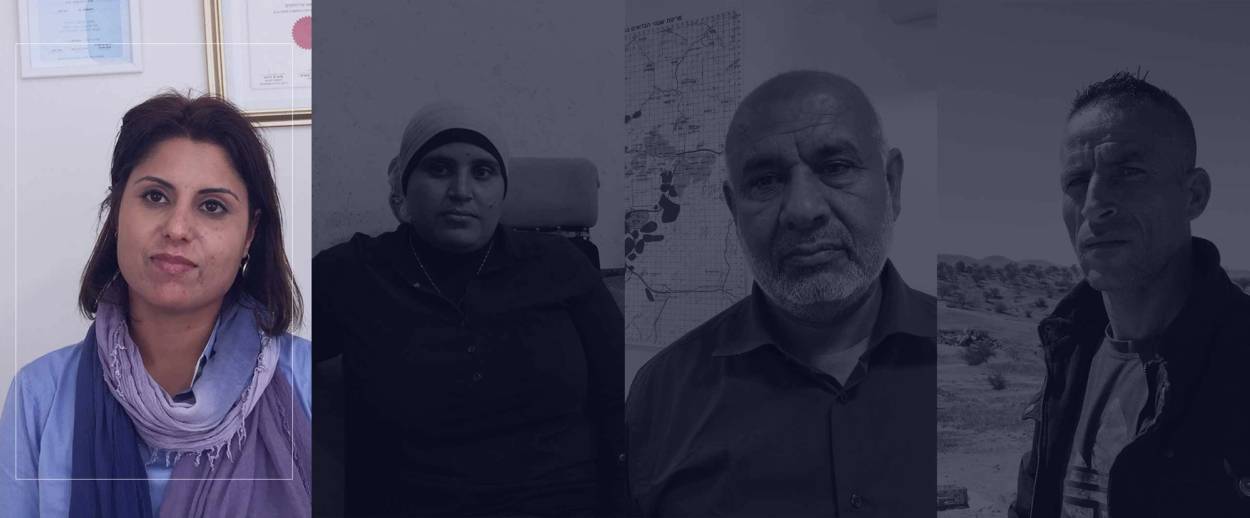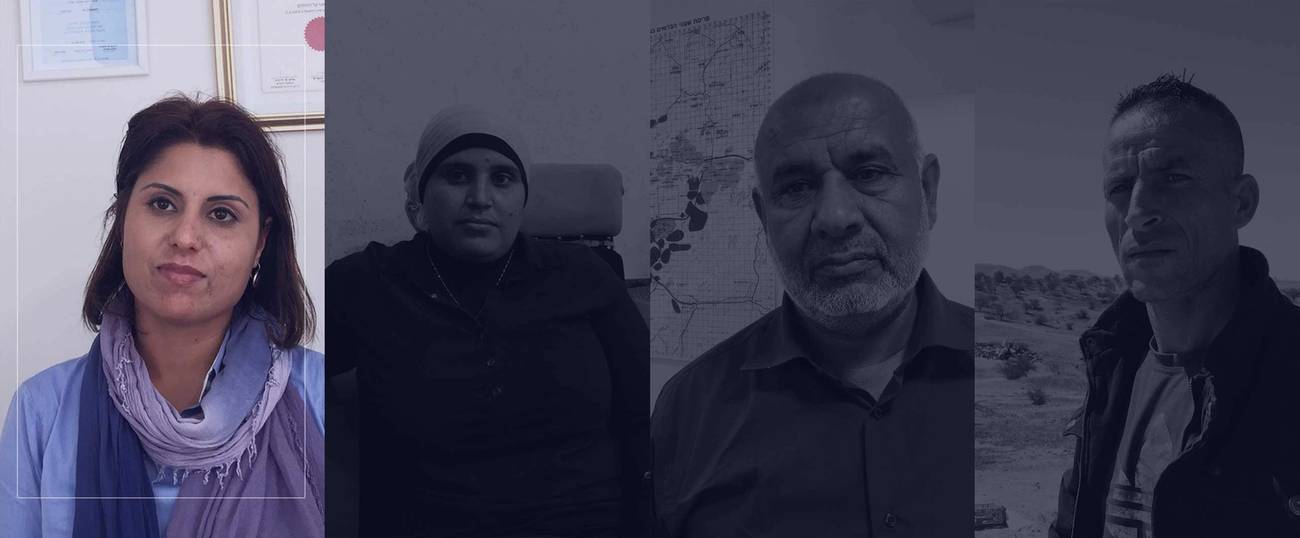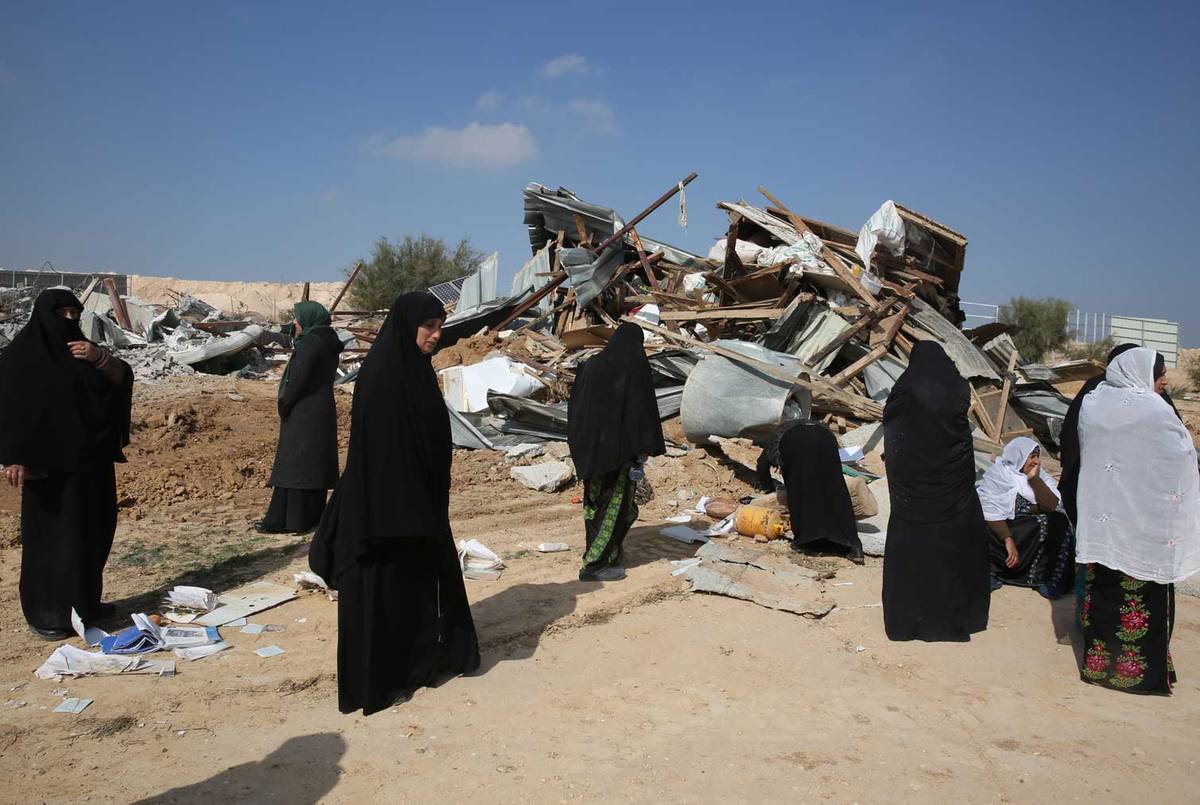Fighting the ‘Patriarchal Deal’ Between the State of Israel and the Bedouin
Israeli Arabs at a Crossroads: How one woman in the Negev stands up against polygamy, abuse, and ignorance




Two pictures adorn the wall of Insaf Abu Shareb’s fifth-floor law office in Be’er Sheva. One depicts a flock of doves flying over a Bedouin shantytown in the Negev desert, not unlike the one she grew up in. The other is a framed poster of Martin Luther King Jr.’s landmark speech at the March on Washington in August 1963.
“I have a dream that we, Bedouin women, will end up somewhere better,” she said. “We are so discriminated against, our rights so trampled upon. I dream that one day this wrong will be replaced by justice.”
Abu Shareb runs the southern office of Itach, a feminist nonprofit that lobbies the government to promote women’s rights. A year ago, she started her own private practice, representing Bedouin women fighting for custody and financial independence in family and Sharia courts. Today she is one of fewer than 10 Bedouin women practicing law in Israel.
Her story began in an orchard outside Rishon LeZion, where her father, a farmer, cultivated citrus trees on land rented from a Jewish landowner. At the age of 6, her idyllic memories of climbing trees and playing with friends in the orchard ended when Abu Shareb was sent to live with her paternal grandmother in the village of Sdeir—an unrecognized Bedouin community on the Be’er Sheva-Dimona highway. “At my grandmother’s, I had to herd sheep and harvest the crops. It was a completely different lifestyle than the one I was used to,” she recalled. “The disconnect from my mother destroyed me. It felt as though my parents abandoned me, as though they didn’t care about my child’s soul.”
For the first three years of primary school, Abu Shareb, the third of 17 siblings from the same mother, would walk across the desert terrain to school in the nearby town of Arara. She will never forget the first day of school, standing alone on a dirt mound overlooking the highway she would have to cross. “That was my first challenge. I felt like I was going to die.”
Living in a tent, then a tin-paneled shack with no running water or electricity, Insaf skipped almost all of her third-grade classes, forcing her parents to move back to the village and tend to her and her siblings. Yet Insaf soon emerged as an exceptional child. “Around middle school, I realized that education would be my only window to the outside world,” she said.

One event that solidified her resolve to lead a different life than that of the typical Bedouin woman was the engagement of her 15-year-old ninth-grade classmate. “We went to visit her at home after she’d dropped out of school,” Abu Shareb remembered. “When she told us about her experiences preparing for her wedding night, with all the women of the village coming over to wax her, I told myself ‘I’m never going through this.’ I couldn’t get my head around this girl sitting at home.”
Abu Shareb successfully completed her high school exams and decided to travel north and study law at Netanya College. Reluctant to send her so far from home, her father rented her an apartment with no roommates, believing they would be a bad influence on his daughter. He drove her to and from school. “My neighbors thought I had a malignant disease and required hospital treatment,” she recalled bitterly.
Veiled and isolated from her Arab and Jewish classmates, she remembers her university years as a depressingly lonely time. “I have no nostalgia for academia,” she said. “No one came near me due to my external appearance, but there was an entire village back home waiting for me to fail. I wouldn’t let that happen.”
At the beginning of her third year, the Second Intifada erupted, and she decided to remove her veil for reasons of personal safety. She would put it back on when she approached her village down south. But even after successfully graduating with a law degree, her traditional appearance continued to hinder her efforts to secure a legal clerkship, even within her own society.
“They would be impressed by my grades, invite me for an interview, and then be taken aback by my appearance,” she recalled. “One Bedouin lawyer told his secretary, ‘Call in the Taliban woman.’ He then told me he filled the position with another intern.”
Desperate to excel in her legal career, Abu Shareb discarded her veil for a clerkship in the Be’er Sheva Magistrate Court. This time, the veil stayed off for good. “The veil is a serious stumbling block. It’s not easy to walk around in traditional garb; you’re branded, treated differently. I sense it when I walk around with my [veiled] sisters.”
“Bedouin patriarchy wants us veiled and modest,” she explained, “but I don’t accept that: The veil doesn’t make me more modest. I’ll do as I please.”
***
About a third of Bedouin households in Israel are polygamous, according to government statistics. Despite a penalty of up to five years in prison for men marrying more than one wife, the state does almost nothing to disrupt the age-old Arab practice, to the dismay of Abu Shareb and her feminist colleagues. Just 27 police investigations were launched against Bedouin polygamous men between 2007 and 2012, according to a Knesset report penned in October 2013. Several women even appear in the official interior-ministry registry as married to the same man.
Seated in Abu Shareb’s tiny Be’er Sheva firm is Islam, 36, who recounts her heart-wrenching life story. Abu Shareb has heard her tale and similar ones many times before, in all their terrible detail. Like Abu Shareb, Islam was raised in an unrecognized Bedouin village in the Negev. She was just 20 days old when her father took a second wife and moved out of the house, abandoning her and her four siblings. It is typical for the Bedouin man to leave his household when taking a second wife, often leaving the first wife and children to fend for themselves with no financial aid.
Islam was raised by her grandmother and dropped out of school in third grade, serving as a domestic servant for her older brother and shepherding for her estranged father. “My father would beat me when he saw me working for my brother’s wife, and my brother would beat me for working for my father. I was in a state of nervous breakdown. I had no hope in life, everything was ruined.”
At 15, Islam was told she would marry her cousin, a paraplegic, whom she’d never met before. “I saw them bring furniture into the house, but I didn’t know how old he was or anything. There was no telephone, no electricity, nothing. I started screaming.”
The domestic violence intensified after the arranged marriage. Four years after her wedding, and with two children, her husband would abandon her to take a second wife. “I couldn’t believe it. I thought he was kidding when he told me that. When I first married, they said he wouldn’t take another woman because of his handicap.”
Eventually, after being kidnapped and imprisoned in her brother’s home for over two years with no contact with the outside world, Islam managed to escape, taking refuge with another Bedouin family in a nearby unrecognized village. She was introduced to Abu Shareb in 2006, who managed to secure her guaranteed minimal income from social security.
“I wasn’t living among human beings,” she summarized her bitter life. “They were wild animals.”
***
Abu Shareb believes the state should tackle the scourge of polygamy by providing better education, better social services, and better public health, not through criminal enforcement. “Let’s imagine a man with four or five wives and dozens of children,” she explained. “I suppose he lives with at least one woman, supporting her children. Tomorrow he’s locked up. What fault is it of theirs? Their situation will surely deteriorate. My primary goal is to educate and rehabilitate my society. Eventually, we will raise a generation that doesn’t believe in polygamy.”
‘Bedouin patriarchy wants us veiled and modest, but I don’t accept that: The veil doesn’t make me more modest. I’ll do as I please.’
Abu Shareb claimed official Israel has conspired with Bedouin tribal chiefs in a bid to prevent a social uprising, in what she called “the patriarchal deal.” She added, “Arab society simply sells us out, ignoring our interests. It’s no different than the Israeli establishment.”
According to Bedouin society researcher Rawia Abu Rabia, Bedouin men circumvent Israel’s polygamy laws by marrying their first wife only religiously, refraining from registering the marriage with the state. The children are listed solely under the wife’s name, who is officially recognized as a single mother. Alternatively, men can marry their second wife according to Bedouin customs, known as zawaj ‘urfy. This is often the case with women from the Palestinian Territories, who are not Israeli citizens.
Marrying multiple wives is a status symbol for Bedouins, and becoming more so even among educated families. Joint Arab List member of Knesset Taleb Abu Arar is married to two women, a fact that sends a terrible message to society, she added. Ahead of the previous general elections in 2015, Abu Shareb and her colleagues protested Abu Arar’s inclusion in the list through a conference at Ben Gurion University on the perils of polygamy.
“Bedouin women are in a struggle for survival, an endless fight to receive their basic rights,” Abu Shareb said. “Bedouin society is Israel’s backyard, and Bedouin women all the more so. We only become part of the agenda through our misery, but even when a murder takes place, it doesn’t make headlines.”
As her legal career took off, Abu Shareb and her husband relocated to the predominantly Jewish city of Be’er Sheva, then to the affluent suburb of Meitar. She said the choice was easy.
“I wanted to get away, to guarantee my quality of life. I wanted my children to have the frameworks and opportunities for the best upbringing possible. In terms of peace of mind, it’s different than living in a Bedouin village.”
***
This is the second dispatch in a Tablet series, Israeli Arabs at a Crossroads: The Negev. The third appears tomorrow.
Elhanan Miller (@ElhananMiller) is a Jerusalem-based reporter specializing in the Arab world.